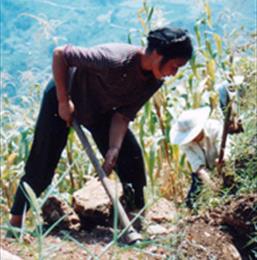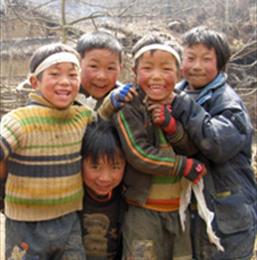Apr/May 2002
31st May 2002
Women's Micro-Credit
A new season of women's micro-credit loaning has now begun. We reported last year at this time that DORS introduced our micro-credit scheme to hamlets 1,8 and 9 of Moduo Village as an experiment. We are now happy to report that after receiving 100% repayment from these hamlets, we have now expanded the scheme to give all households across the nine hamlets of Moduo Village the opportunity to participate in this scheme. In total, 228 households have participated, with 185,400 RMB (GBP 16,121) loaned out.
Most of the women in Moduo are using their loans towards developing animal husbandry projects: mainly raising chickens and pigs for sale. Through discussions with the village women, we learned that they were keen on learning more techniques for raising healthy animals, and prevention of common diseases. Thus, prior to loaning, DORS arranged a 2-day training session hosted by the Hanyuan Animal Husbandry Bureau. This training session, covering sanitation, breeding, mixing feed, vaccinations, and dealing with different illnesses for chickens, pigs, cows and goats was very well received with high village turnout.
After 3 years of micro-credit in Na'er Village, we have begun a new round of loans, this time increasing the maximum loan amount from 1000 RMB to 1500 RMB per household.
Banyang 1, where loans were increased to 3000 RMB per household last year, was met with 100% repayment. They have now begun their fourth round of participation in DORS women's micro-credit scheme.
DORS News and Information
After 18 months of commitment as a Volunteer Project Officer Elsa Fan left DORS at the end of April to return home to the States. DORS would like to thank Elsa for all of her hard work and dedication to this organisation, and we wish her all the best for her future career in development.
In May, DORS was pleased to host visits from two of our funders. Sylvia So of Hong Kong's Kadoorie Charitable Foundations visited our project sites in Zhongpu and Baikun villages of Lianghe Township, Ganluo County. There, we viewed progress on our Fuel-Efficient Stove, Education, and Community Water Supply Projects. Oga Thingo of Germany's Misereor also came out to Hanyuan for a visit. We viewed Water Supply and Animal Husbandry projects in Chenhe Village as well as Education and Micro-Project Loans in Wanping Village. It was our pleasure to host these visits, and we hope that they both had a pleasant stay with us at DORS.
Songjiang Village Community Water Supply System Completed
Songjiang Village's hamlets 4 and 5 have now completed their piped water supply, bringing fresh mountain spring water directly to the 48 households (population 156). Previously, villagers were drinking water from a nearby river that was polluted with animal faeces and runoff from household washing and are much happier now with their clean and convenient supply. Villagers provided the labour and installed the system themselves. Material and transport costs were provided with a grant from Germany's Misereor. A total of RMB 36,932 (GBP 3211) was expended.
As with all of DORS water supply projects, this system was managed and constructed by the villagers with technical assistance from the Hanyuan Water Conservancy Bureaus. Local ownership of the project, from inception to completion is one key factor in ensuring the sustainability of the water supply.
Forestry Training and Stocking of Nurseries
A one-day training session was organised in Banyang 9 where DORS has been supporting forestry projects for a number of years. This training session, given by forestry expert Mr. Bai Yong, was informal and participatory, allowing villagers the opportunity to ask questions while techniques were demonstrated. Topics covered in this session included: pruning, application and maximizing uptake of fertiliser, as well as pest management.
In order to maintain a sustainable supply of tree saplings within the village, informal nurseries are being cultivated in Wanping and Chalin villages of Pianma Township. In April, DORS transported seeds to stock these nurseries with support from the Kadoorie Charitable Foundation as one component in our Integrated Community Development Programme.
Sustainable Water Supply Management Project
Following from the training sessions held last November in water supply maintenance and management, village representatives have now devised different management systems for their respective water supply systems with regulations specific to each situation. For example, in areas where water is in short supply, villagers have come up with different means of handling the water shortage, from fines for leaving the water running, to setting up windows in time for people to use water. This exercise is helpful in ensuring the long-term sustainability of the water supply systems, as it allowed villagers to discuss their respective situations, and come up with management strategies themselves, giving them ownership over not only the water supply system but the responsibility for its long-term management and maintenance.
Where necessary, structural improvements to these existing water supply systems have begun, with any future repairs the responsibility of the individual water user groups. This sustainable water supply management project is made possible with support from the British Embassy's Small Grant Scheme.


